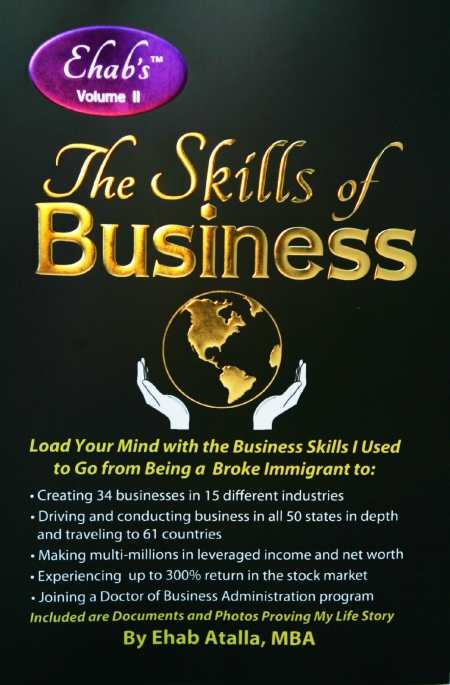The Skills of Business
No-nonsense advice on the skills needed to succeed in business doesn’t shy away from the hard truths of growing as an entrepreneur.
The second in a series of business books written and published by a self-made millionaire, this guide is particularly useful for those interested in starting a business. When the author of a business book writes that he “started 34 businesses in 15 different industries from scratch,” the book takes on a certain credibility. When the author also says he went “from a broke, new immigrant cashier who couldn’t speak English to becoming a multi-millionaire entrepreneur,” any reader with a desire to start and run a successful business cannot help but be intrigued. Thankfully, Ehab Atalla’s book, The Skills of Business, is more than boasting—it is a well-written, substantive guide to business, enhanced with the street-smart wisdom only a self-made businessperson could provide.
Atalla divides the book into seven specific skills that are more about ways of thinking than business competencies. For example, the first skill, “Flexibility,” demonstrates Atalla’s awareness of the need to have a broad understanding of every aspect of business. When the author learns to “connect different subjects and see the underlying similarities,” he is able to apply the same business skills across fifteen different types of businesses. He also makes the intriguing point that, while American society seems to encourage being specialized, it was his ability to generalize and be flexible that opened him up to more opportunities.
Atalla does not shy away from giving plenty of advice, some of which may strike readers as blunt if not crass. “My philosophy is simple—everything I own is for sale,” he writes. When discussing negotiations, Atalla writes, “I really don’t care about the deal. So I automatically put myself and my subconscious in a very strong position. Once you don’t care about something (when you don’t fall in love with it), you are the one with power.” As for friends and enemies, “the last one that can hurt you is your enemy, and the person who will likely hurt you is your friend,” because with enemies, “you expect their attack,” but “by trusting your friends, you blind yourself to the bad things they can do to you.”
Even readers who don’t agree with Atalla’s philosophy or find his style to their liking will probably benefit from his observations. In addition to covering a broad range of business skills in various areas—everything from finance to personnel to marketing—The Skills of Business includes an informed discussion of investing that touches on compounding, real estate, and the stock market. There are some nice extras at the end of the book as well: five appendices address such things as global trade and the basics of supply and demand. The author even includes a listing of his favorite stock picks. The book is also professionally designed: chapters are short, and they have plenty of subheads, bold and italicized text for emphasis, and the occasional chart and graph.
The Skills of Business is authoritative and informative. It should prove especially useful to the budding entrepreneur.
Reviewed by
Barry Silverstein
Disclosure: This article is not an endorsement, but a review. The publisher of this book provided free copies of the book and paid a small fee to have their book reviewed by a professional reviewer. Foreword Reviews and Clarion Reviews make no guarantee that the publisher will receive a positive review. Foreword Magazine, Inc. is disclosing this in accordance with the Federal Trade Commission’s 16 CFR, Part 255.

